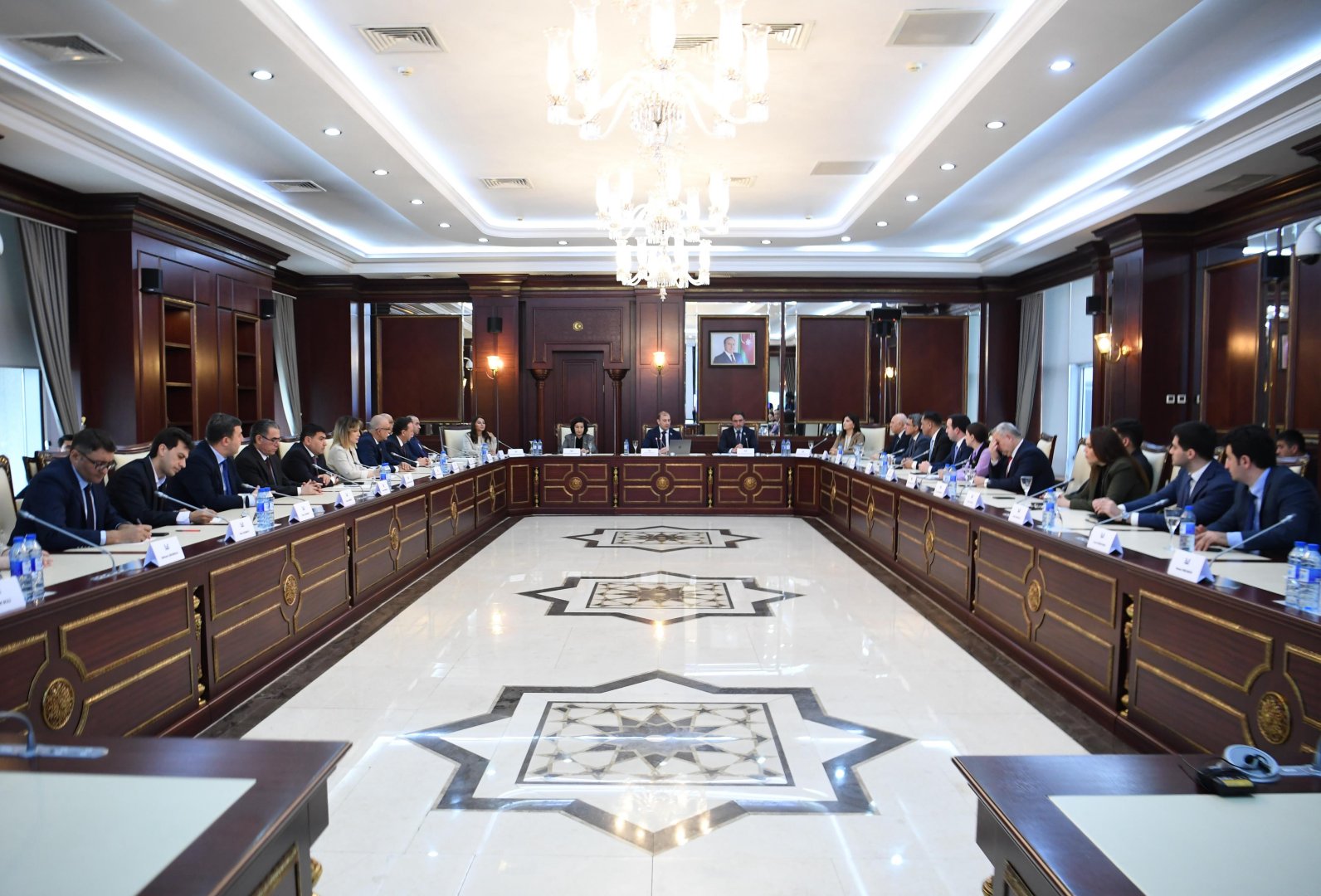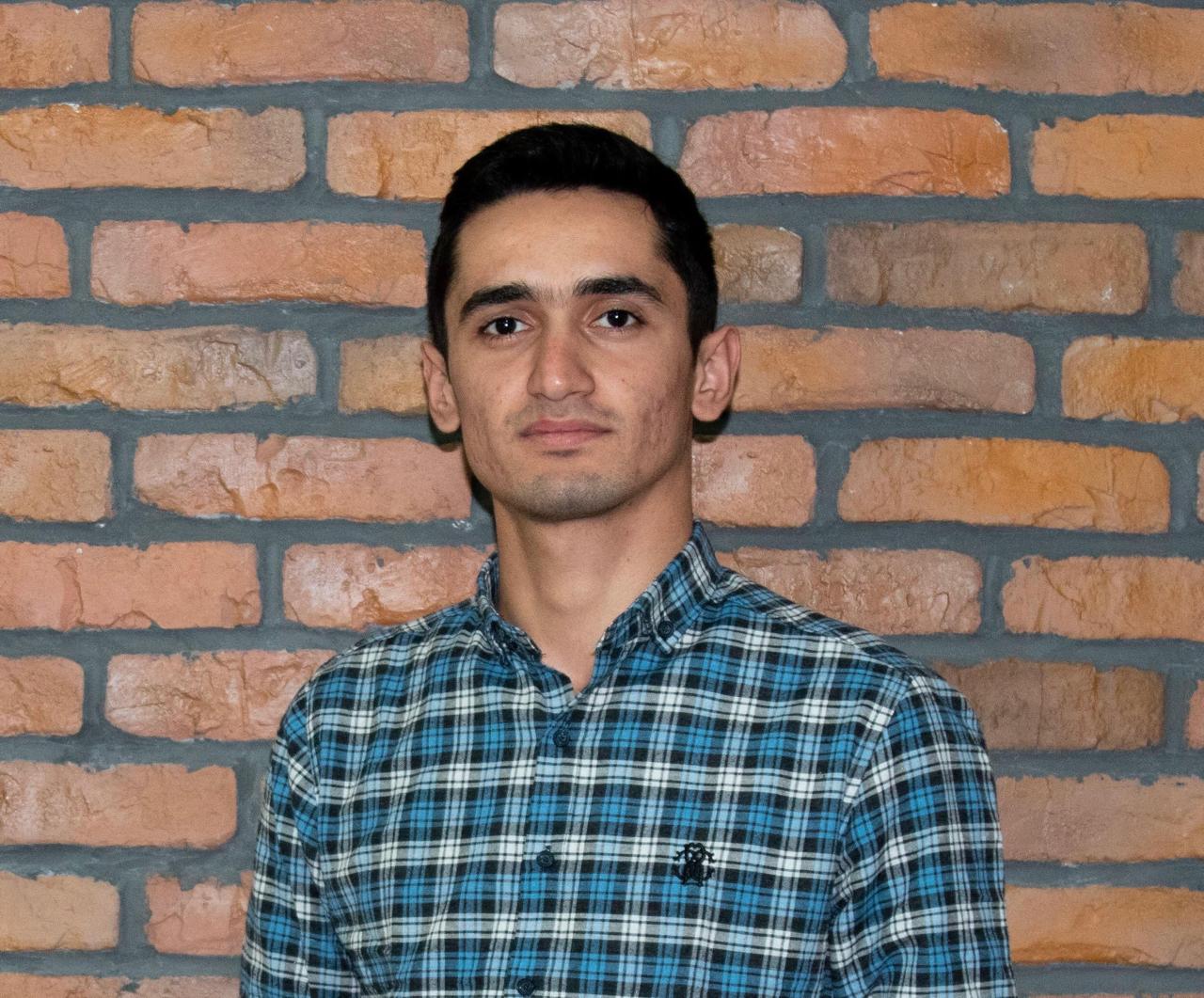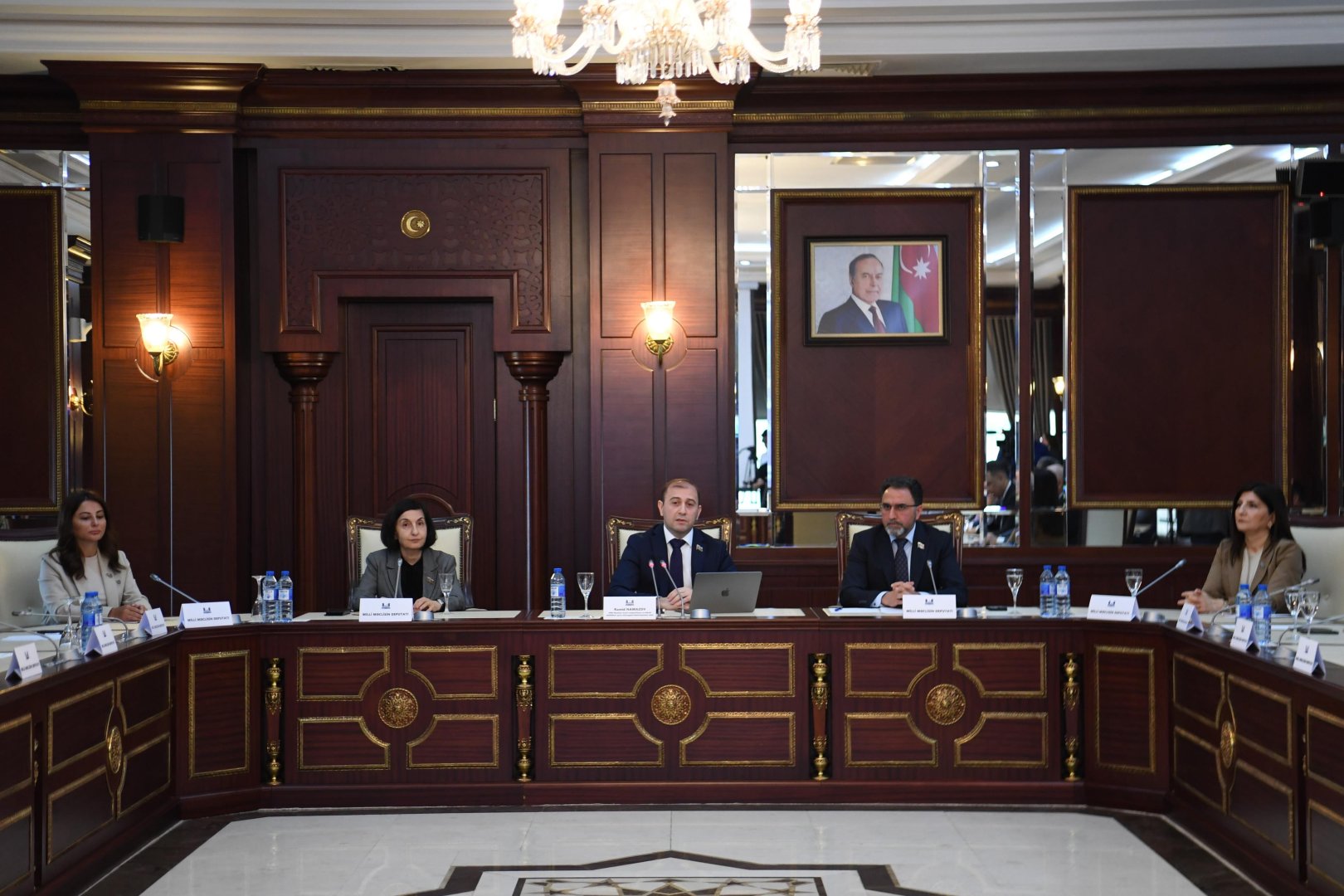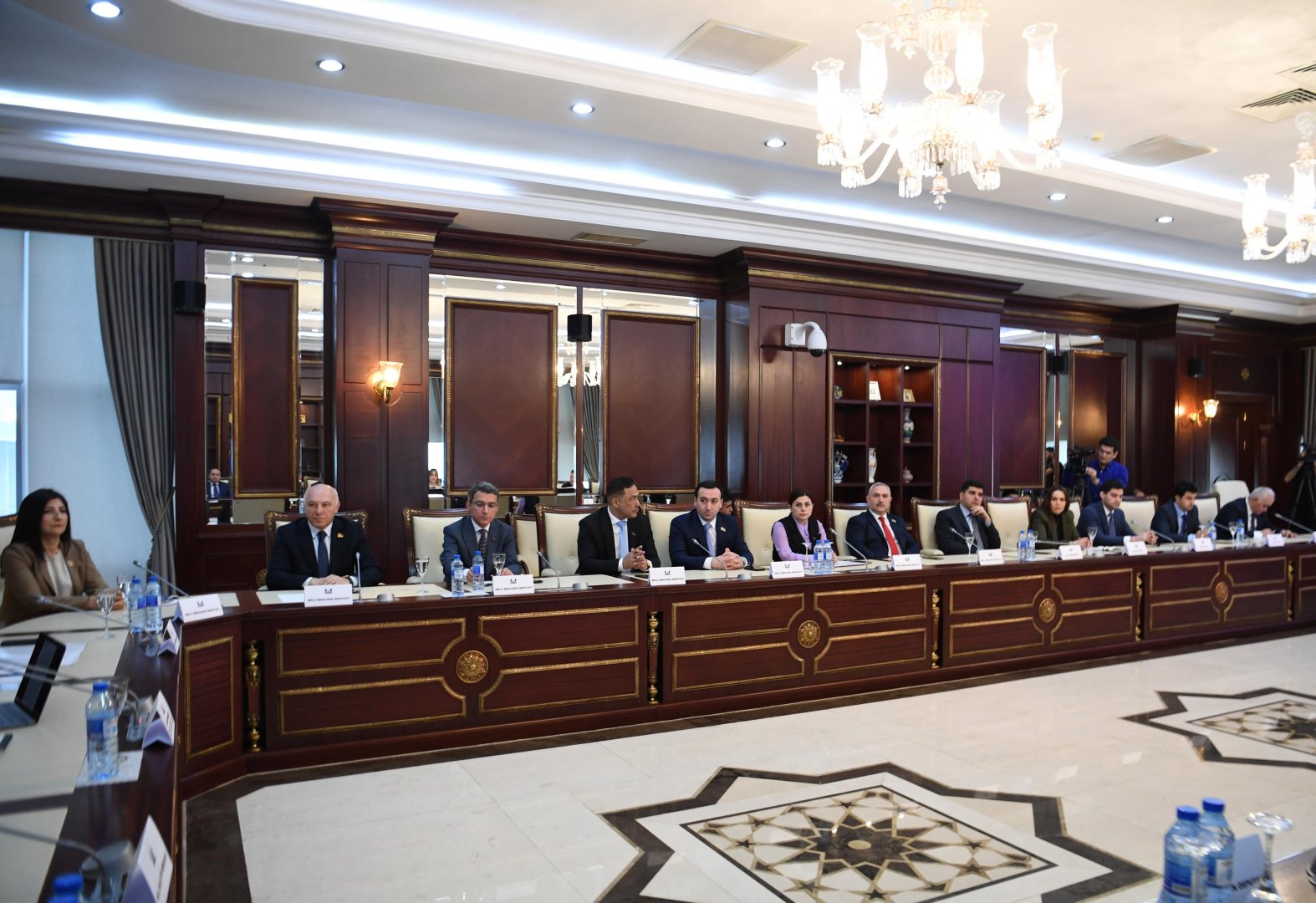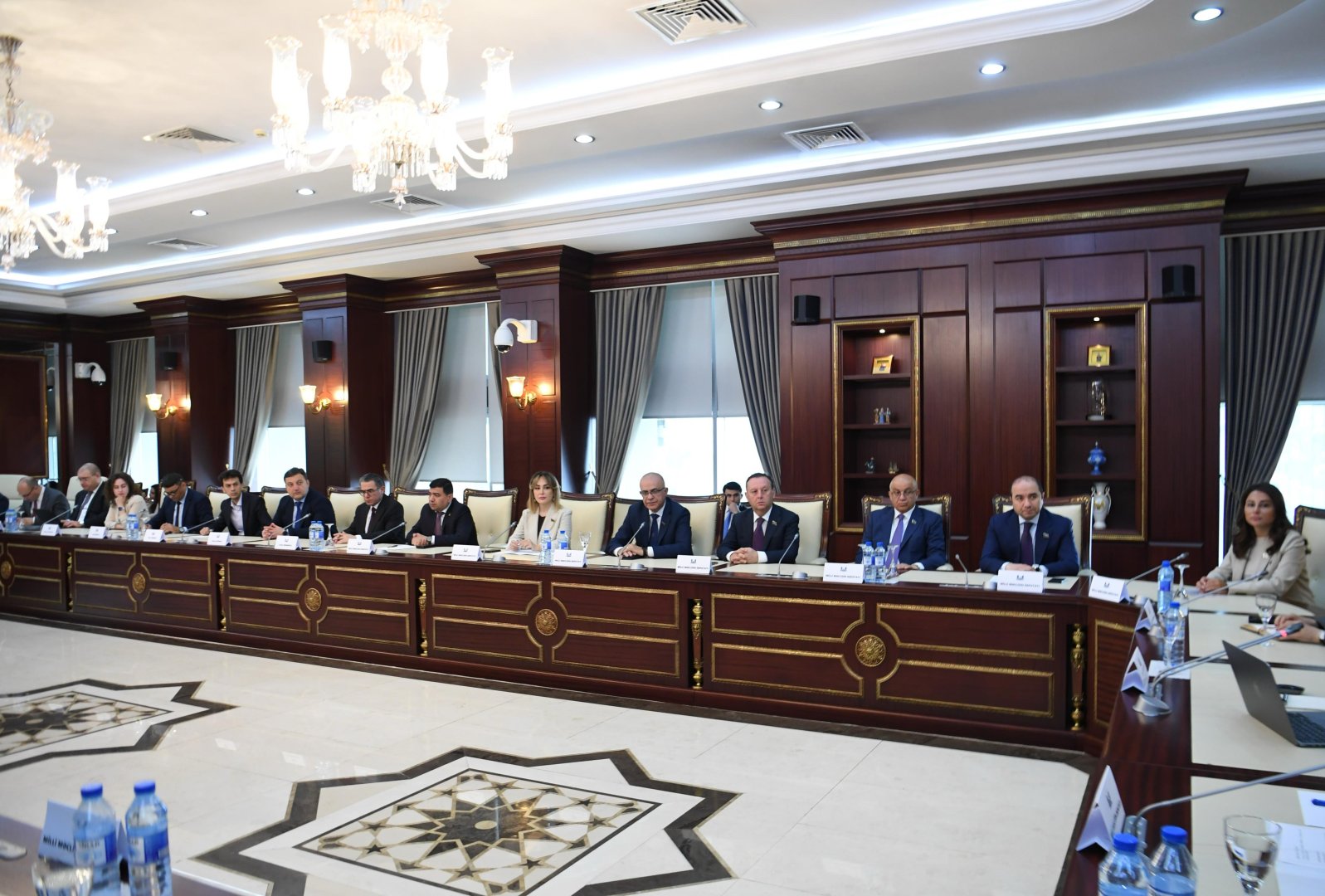BAKU, Azerbaijan, April 24. A public
discussion on "Hybrid Attack under the Guise of 'Peace Mission'
Targeting Stability in South Caucasus" was held on April 24 by the
Temporary Commission on Foreign Interventions and Hybrid Threats of
the Azerbaijani Parliament, the Parliamentary Press and Public
Relations Department told Trend.
The event saw a full house with members of Parliament, media
representatives, think tank members, civil society representatives,
experts, and a host of other officials all in attendance.
Ramid Namazov, the Chairman of the Temporary Commission, noted
that the public discussion on the EU’s mission in Armenia was
organized based on the instructions of the Speaker of the
Azerbaijani Parliament, Sahiba Gafarova.
The meeting highlighted that one of the main obstacles to peace
in the South Caucasus, a region subjected to various geopolitical
interests, is the missions created by the EU within the framework
of its Common Security and Defence Policy (CSDP). The presence of
hybrid threat elements directed against Azerbaijan's interests was
observed within the activities of these missions, prompting the
Milli Majlis to launch a special investigation, resulting in a
document titled "Hybrid Attack under the Guise of 'Peace Mission'
Targeting Stability in South Caucasus."
Namazov presented the findings of the special investigation in a
PowerPoint show, highlighting that a significant source of
contention between the two nations was the unacceptable deployment
of military from third-party countries along the Armenia-Azerbaijan
border.
He also mentioned that the territorial integrity and sovereignty
of Azerbaijan, under the leadership of Supreme Commander-in-Chief,
President Ilham Aliyev, have been fully restored, but this reality
contradicts the interests of certain circles in the West,
particularly within the EU and its member states. These circles,
utilizing EU resources, have started to form threats against
Azerbaijan's sovereignty, including hybrid threats, under the
influence of Armenian lobbying groups.
As a result, he noted, these circles, leveraging the resources
of the European Union and its institutions, began to orchestrate
threats to Azerbaijan's sovereignty and territorial integrity,
including hybrid threats, under the influence of the Armenian
lobby. The most intense phase of these hybrid attacks occurred from
the moment the decision to host the COP29 event in our country was
made until the event's conclusion.
Speaking about the details of the investigation, the chairman of
the temporary commission highlighted that the document outlines the
history of Azerbaijan-European Union relations and emphasizes the
principles established in international law regarding territorial
integrity, border inviolability, and respect for sovereignty, as
reflected in the documents signed to date.
The investigation also thoroughly examined the secrecy
surrounding the operations of the EU missions in Armenia, revealing
illegitimate features in their composition. In particular, it
scrutinized the lack of transparency in the activities of the most
recent mission, the criteria used for personnel selection, the role
of supporting states, and the intelligence-driven activities
carried out under the guise of "peace and confidence-building."
The document further explores the actions taken by the mission
that could potentially escalate risks of new conflicts in the
region, the financial and military support provided, the response
of regional countries to these actions, France's involvement in the
process, and potential future scenarios.
The report also detailed that the document includes satellite
imagery showing changes in military infrastructure on the Armenian
side of the Armenian-Azerbaijani border following the arrival of
the EU mission in Armenia. Additionally, it presents a chronology
of military provocations carried out by Armenia over the past three
years, as well as the professional backgrounds of some individuals
involved in the mission.
Furthermore, the study included a survey among Azerbaijani
citizens regarding the European Union's mission in Armenia.
Following the investigation, the temporary commission’s
recommendations on the necessary actions concerning the mission's
activities were outlined.
During the event, Deputy Chairman of the Committee on Public
Associations and Religious Organizations of the Azerbaijani
Parliament, Sahib Aliyev, Deputy Chairman of the Committee on Human
Rights, Arzukhan Ali-zadeh, and temporary commission members Sevil
Mikayilova, Gulshan Pashayeva, Zaur Shukurov, and MPs Elman
Nasirov, Elchin Mirzabayli, Nigar Mammadova, and Parvana Valiyeva
emphasized the relevance of the public discussion's topic. They
discussed the importance of the peace agreement for ensuring
regional stability and security, noting that Armenia is actively
hindering this process in every possible way.
The MPs stated that the EU Mission in Armenia (EUMA), which
presents itself as a civilian mission, is in fact functioning as an
espionage operation, with its activities designed to exacerbate
tensions in the region. They emphasized the importance of fostering
an atmosphere of trust between Azerbaijan and Armenia to establish
lasting peace in the South Caucasus, along with the need to shape
public opinion in this direction.
During the public discussions, Ellada Aliyeva, Head of the UNEC
Research Foundation Department, Sanan Najafov, an expert on
combating disinformation, Shabnam Safarova, Chairwoman of the "For
the Progress of Karabakh" Public Union, Aziz Alibeyli, Head of the
Social Research Center, and Ayaz Mirzayev, Chairman of the
Azerbaijan Journalists Network, highlighted the significance of the
information presented in the report. The speakers shared their
insights on how to counter hybrid threats aimed at Azerbaijan and
proposed strategies for effective responses in this area.
Wrapping up the event, Namazov noted that the Republic of
Azerbaijan has consistently adhered to the principles of
international law, emphasizing cooperation based on mutual respect
and equality in its relations with the EU. This commitment has been
clearly reflected in signed agreements, diplomatic negotiations,
and interparliamentary exchanges. However, he expressed concern
that, following the full restoration of Azerbaijan's territorial
integrity and sovereignty, certain EU institutions have become
influenced by some Western circles and are being used as tools to
advance hybrid threats against Azerbaijan.
According to the Commission Against Foreign Interference and
Hybrid Threats, one of the primary tools used in hybrid attacks
against Azerbaijan is the series of anti-Azerbaijani discussions,
hearings, and resolutions initiated or adopted in the parliaments
of European Union member states, including the European Parliament
and France. Another significant instrument is the actions carried
out through the EUMA.
Research has revealed that under the pretext of "peace and
confidence-building," the EUMA is actually engaging in intelligence
operations in the region. There is substantial evidence that the
mission, which is supposed to function as an observer on the
Armenian side of the border, is actively involved in the
construction of military infrastructure and fortifications, with
its "observers" conducting espionage activities targeting
Azerbaijani territories.
The commission also highlighted the provision of offensive
weapons to Armenia by France and the country's preparations for
future international military operations, including those led by
the EU, which heighten the risk of new conflicts in the South
Caucasus and the broader region. The commission concludes that for
peace to be established in the region, Armenia must halt external
influences and third-party interference, adopting a more
constructive and sincere approach.
In conclusion, Namazov articulated his appreciation for the
productive dialogues surrounding the subject matter and conveyed
his gratitude to all stakeholders involved.
Stay up-to-date with more news on Trend News
Agency's WhatsApp channel

